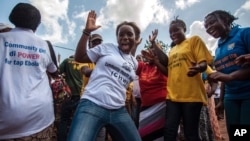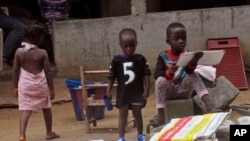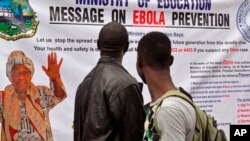Guinea and Sierra Leone have been declared Ebola-free, while Liberia is expected to follow in mid-January. Experts say that health care systems need to be rebuilt and that safety practices adopted during the crisis must be maintained to prevent future outbreaks.
The epidemic touched many parts of society in the three countries stricken by the virus. Economies declined as quarantines affected cross-border trade, while unsteady health care systems collapsed.
The outbreak, which started in March 2014, killed over 11,000 people and infected over 28,000.
Children heavily impacted
UNICEF says children have been particularly affected. It says 22,000 children in Sierra Leone, Guinea and Liberia have lost one or both parents.
Children also missed vaccinations, and several million between ages 3 and 17 missed from six to nine months of school.
Parents stopped registering their children at health care centers, which many considered to be places where the disease could be easily contracted.
"A child that is not registered does not exist in an administrative sense," said Patrick Moser, a spokesman with UNICEF in New York. "They're vulnerable to exclusion; it's difficult to obtain identity documents, have access to basic health and social services, and there's even the danger of being trafficked or illegally adopted."
Education gains must be maintained
UNICEF says the outbreak reinforced the need for educating rural people on simple methods of stopping the spread of the virus.
But this was complicated by rumors and misinformation. Some said the outbreak was created by the West and health care workers were there to kill people or force them into trafficking.
Dr. Mohamed Ayoya, UNICEF's representative in Guinea, told VOA in an email that at the beginning of the outbreak, people told him that “the treatment centers are really 'extermination camps' and once you agree to go there, you'll never come out.”
"To many,” he said, “treatment centers were places where shady tests were conducted, where people were used as guinea pigs to carry on various experiments and then killed to get their organs." Ayoya said. "Most thought that spraying their houses with chlorine water, which was used by the Red Cross, was actually a way of spreading the disease."
UNICEF countered with efforts of its own.
Moser said that in Sierra Leone, sirens on ambulances scared people and fueled rumors that bodies were being stolen. So the sirens were removed, and the community members and leaders were invited to ride in the vehicles.
"They'd come out and tell the rest of the community, 'Look, I came back, I'm alive. I didn't die in the ambulance. It's safe,' " he said. "Little things like that made a huge difference.”
In a similar case, he said one young farmer in Guinea was helping to build roadblocks to keep health care workers out of the community. The farmer said the responders were forcing people into slavery and selling body parts.
"Until one day his 15-year-old niece got Ebola and was taken to an Ebola treatment center. She returned to the village alive and well. Everyone was astonished," Moser recalled.
Her uncle is now a social mobilizer active in the public education campaign against the virus.
Replacing traditions with safe practices
UNICEF revived 23 community radio stations and built six new ones to strengthen the education program. They emphasize efforts to prevent the spread of Ebola — like frequent handwashing, particularly in schools. Many people have stopped shaking hands, a widespread tradition in West Africa.
Families are discouraged from touching sweat, urine and other fluids from those infected — and to call an ambulance or pickup vehicle for the ill or deceased. At funerals, the family is also taught to refrain from touching the dead. The bodies are sprayed with chlorine and put in white plastic bags for burial. In Liberia, the bodies are often burned after the funeral.
UNICEF says financial support is needed to continue supplies, to rebuild education and health systems, and to improve water and sanitation. Extended families who have taken in children will need cash transfers and other assistance.
Health experts say that will depend on the continued support of the donors once the urgency of the crisis fades from the international media.







